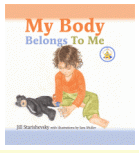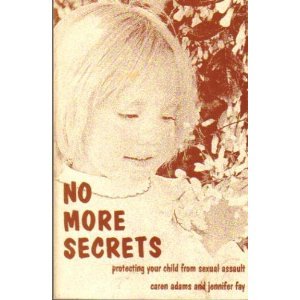Parents guide to the signs of childhood sexual abuse; safety tips to teach children and teens to from abuse and crucial tips parents, child givers and educators must know to help keep children safer
“Childhood sexual abuse.” The term sends shivers down our spins. It’s the unthinkable phrase on every parent’s lips. It’s the nightmare we pray will never happen to our children. But the fact is sexual abuse is a horrific truth that can happen to any child.
No race, creed, demographic, gender, or age can be spared. Please don’t utter: “It could never happen to my child” phrase. Childhood sexual abuse does happen to any family, and the news is rampant with incidents from the Sandusky trial to Boy Scout files to Catholic priest incidents with the sad truth. This week allocations arouse in my own Los Angeles area of a fourteen year old boy sexually abusing a four-year old at his mother’s day care center.
Predators and pedophiles are not always the “strangers” or “dirty old men” we assume.
90 percent of sexual offenders are people the child or your family knows-including the parents’ friends, a baby-sitter, an older sibling or relative. (A big reason why we should avoid describing abusers as “strangers” which can be confusing to a child).
“The average age of most sexual offenders is fourteen, and these fourteen-year olds comprise the largest number of sex offenders in any age group.” Criminal Justice Source Statistics and Child Psychiatry Journal
Online predators usually are strangers, but slowly befriend (“groom”) the child, and then try to set up a face-to-face meeting. Review: “Never meet someone online offline.” And: “Who you meet online is rarely the same person offline.” New research is revealing that many of these predators don’t fit the “dirty old men” image but are teen-aged.
The lesson here is don’t get stuck on those movie stereotypes of child predators or pedophiles.
The best prevention methods are to be educated about childhood sexual abuse, keep an ongoing open dialogue with our children, and teach strategies to our kids so they know what to do “just in case.” I’ve provide a guide to some of the best strategies I’ve taught parents and children over the years. These points are not designed for one discussion about sexual abuse, but additions to numerous shorter chats-which children are far more receptive to-depending upon their age and necessity.
Keep in mind that best skills are taught before a trauma so the teaching can “kick in” at the moment of need. Children need lots of rehearsal and practice before they can use any new skill in context.
Most important, our kids need an adult to listen and believe. If you suspect a child is abused it is up to you to act as the adult. Dig further. Seek help. Keep records. Report your suspicions. Children must be protected. Nothing-not an “organizational image” or “football record” should ever stand in the way of our children’s safety and well-being.
Kids & Teens Safety Skills To Help Prevent Sexual Abuse
Define “Private Parts”

Begin by helping your child or teen understand what is appropriate, normal and healthy kind of touches and that touching must be respectful and consensual. Here are pieces of that crucial discussion per age.
Use terms your child understands and that are age and developmentally appropriate.
Remember, you will need many short little chats – not a one time lecture. Studies also show that if you begin these talks early – and naturally – you’ll feel more comfortable talking about “private parts” with your child. Here are tips:
The bathing suit analogy helps: “Parts of your body that your bathing suit covers are private and may not be touched without your permission. The exception is if a parent or doctor needs to ensure your health.”
TIP: Use correct anatomical terms such as “penis, vagina and breasts.” An adult may miss a sign of abuse if a child uses another term for genitals (“He touched my peanut.”) Teens say that if parents use “real” terms, they’re more comfortable discussing sexuality.
Teach “OK” and “Not OK” Touching
For teens emphasize that sexual touching must be “respectful” and “consensual” (which is a fabulous analogy to use for preventing unconsensual sex as well with adolescents). You can also discuss terms such as “sexual harassment,” “violation” and rape.
For younger kids describe “Good, Bad, Helping, and Sexual Abuse Touching” depends on age.
- Good Touches make you feel happy, comfortable, safe and loved like hugs, cuddles, handshakes, and high fives and are from people you care about or love.
- Bad Touches hurt you like when you fall down or get kicked, punched, or tripped
- Helpful Touches a doctor, nurse or parent may do if you are injured or to ensure health.
- Sexual Abuse Touches are forced touches when someone makes you do something you don’t want to do or tricked touches when someone fools you or calls touching a “game” when it isn’t so they can touch your private body parts or get you to touch theirs.
TIP: Know that sexual abuse touches can feel good and sometimes confuse a child, but terms help them grasp differences.
TIP: Levin and Kline emphasize teaching kids “Trickery Touches.” Children also need to be taught that someone trying to abuse them may use force, but more often they will use trickery. “I’ll let you have one of my kittens (or pet my cat), if you will sit on my lap and watch this video.“
Give Permission to Say “NO” Then Practice
Studies show that kids under the age nine rarely say “No” to a sexual offender because they were taught “to obey adults.” So give permission for your child to yell “NO!” to whoever the adult.
Peter A. Levine and Maggie Kline, authors of Trauma-Proofing Your Kids, point out an important point:
“In order for children to develop the capacity to stop someone from improper, hurtful, uncomfortable or confusing touch, they must have practice and experience with the right of refusal in other areas of their life. In this way it becomes a natural part of their self-confidence and is imprinted in their developing brain.”
- Younger: “If someone tries to touch you in places your bathing suit covers or makes you feel at all afraid or uncomfortable, say “NO!” “I will not be angry-whoever the adult is. You will not be in trouble.”
- Teens: “You should expect to be respected and if ever you say “No” to someone’s sexual advance, the person should respect your wishes. If not, get help. (Define rape and abuse).
Use The “No Secrets” Rule

Sexual offenders often try to make kids promise to keep the abuse a secret.
Stress: “If any adult asks you to keep an uncomfortable secret, tell me.” You might say: “It’s okay to not keep a secret even if you promised an adult. If the secret makes you feel bad inside, then it’s a wrong kind of secret and you should tell a trusting adult.”
TIP: Sexual predators often groom a child by promising gifts, treats and outings. Emphasize: “Adults should not give children gifts, ask for favors or promise special outings without telling the child’s parent. Tell me if that ever happens.” Also children need to be warned that they may be told-or threatened-not to tell.
TIP: No More Secrets by Caren Adams and Jennifer Fay teach children to refuse and report a request if it: “Feels funny; Seems like it would separate him/her from other children; Goes against family rules; Involves a secret; or Seems like an unearned “special favor.”
“Tell A Trusted Adult Immediately”

Stress to your child: “If anyone ever tries to touch your private areas, wants to look at your private parts, or tries to show you their own private parts tell me or a trusted adult.”
Also stress: “If ever you don’t feel safe with someone or your gut feeling tells you that something is not right, get help!”
TIP: Brainstorm with your child which adults he could turn to for help. “Which adult would you tell?” “What if that person didn’t help?” For older kids discuss the possibility that while most adults do help, some do not. “So what would you do if the first or second person you went to didn’t help you?”
TIP: Mention that there are child abuse help lines with staff specifically trained to help kids. “Let’s find the hotline for our area. If you or a friend ever need it you’ll know who to call.” 1-888-PREVENT or 1-800-656-HOPE
TIP: Stress that you are always available to talk about anything, and love him no matter what!
Signs of Sexual Abuse in Children and Teens
You’ve taught your child protection skills, but that also is not enough. Keep in mind that many children do not tell. Imagine a child having to say “No,” to a trusted teacher, “good old Uncle Fred,” or even a parent.
Sexual abuse can be a single incident or many acts over a long period of time. There usually are subtle signs along the way that can be overlooked. Look for a change in your child’s normal behavior that last or becomes more intense. Of course, there could be another explanation, but any of these signs should be addressed. If you have any suspicions or a feeling something is wrong, seek help of a mental health professional.
Physical Signs: Bloody, torn, or stained underclothes; pain, bleeding, burning, or itching in genital area; difficulty walking or sitting; frequent urinary or yeast infections; STD or pregnancy
Psychosomatic Signs: Stomachaches, headaches or marked mood swings; nightmares or trouble sleeping; sudden changes in appetite
Sexual Behavior Signs: Uses adult-like sexual knowledge, language or behavior; writes, draws or plays out sexual-type images; frequent use of masturbation
Emotional Signs: Resorts to aggressive behaviors: thumb-sucking, bed-wetting; sudden clinginess; depressed
Behavioral Signs: Shrinks away or seems threatened by physical contact; excessive bathing, poor hygiene; or talks about self as dirty or bad; trouble focusing; seems distracted or distant at odd times; overly protective and concerned for siblings, assumes a caretaker role; talks about a new, older friend; jumpy if the phone rings, a text or email comes in; suddenly has unaccountable money, gifts, toys or mail; runs to mailbox
TIP: If there was something your child said or did that made you concerned, ask. Do know that a child may not admit or deny the abuse usually due to fear, humiliation, guilt or shame, but studies show that if asked, kids generally will tell a trusted adult of their abuse.
Marilyn Van Derbur, author of Miss America By Day: Lessons Learned from Ultimate Betrayals and Unconditional Love, herself a victim, quotes research that found that those children who were abused-but told a parent before age eighteen-encountered the following negative parental reactions (and some experienced multiple responses):
- Anger with them (the child): 42%
- Blamed them: 49%
- Ignored the disclosure: 50%
- Became hysterical: 30%
Children rarely make up stories about sexual abuse. Rarely!
Above all, BELIEVE your child. Please!
If you suspect child abuse please get the help of a trained mental health professional who specializes in childhood sexual trauma NOW.
Dr. Michele Borba, Parenting Expert
I am an educational psychologist, parenting and bullying expert, TODAY show contributor and author of 22 books including Building Moral Intelligence: The Seven Essential Virtues that Teach Kids to Do the Right Thing and The Big Book of Parenting Solutions.
For more about my work refer to my website and blog, Dr. Borba’s Reality Check
Follow me on twitter @MicheleBorba.

